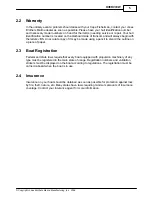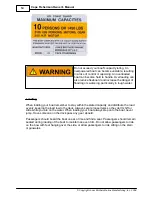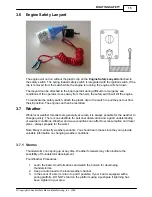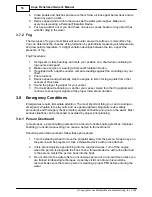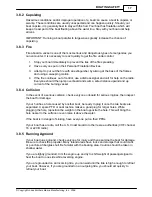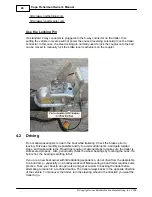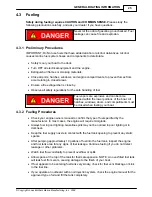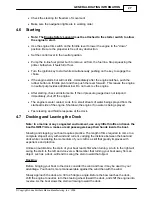
BOATING SAFETY
19
© Copyright Jones Brothers Marine Manufacturing, Inc. 2008
·
NEVER operate or allow anyone to operate your boat while under the influence of
drugs or alcohol.
·
Maximum care should be used when refueling your boat
·
Know the fueling capacity and average fuel consumption at frequently used RPMs.
Ensure sufficient fuel is onboard for anticipated cruising requirements. Keep an
adequate reserve of fuel in case your plans change due to weather or other
circumstances.
·
Watch the weather and do not go out when there are storm warnings. If you are caught
in a storm, reduce speed, head into the wind/waves, and keep all gear and passengers
close to the center line of the boat for stability. Wear personal flotation devices and
head for the nearest shelter.
·
Instruct at least one passenger on the fundamentals of basic boating and safe
operation in the event of an emergency.
·
While boating, passengers should be settled in a safe position. Use handholds and
rails for steadiness.
·
Signs and signals for help are: raising and lowering your arms, waving a shirt tied to a
pole, repeatedly sounding your horn, flying your boats ensign upside down, or the
lighting of flares.
·
Keep your boat speed under control. Respect for other boaters and those on shore is
common courtesy. The operator of a boat is responsible for injury or damage caused
by the boat or the boat's wake (the wave the boat leaves behind). Your wake could
swamp or damage a smaller craft and endanger its passengers. Stay alert to areas
having signs posted "No Wake Zones".
·
Become familiar with the handling personality and limitations of your boat.
·
Never allow swimmers to enter or exit the boat with engines running. A shift lever in
neutral could become engaged accidentally, causing serious harm to swimmers.
·
When venturing into foreign waters, collect information on the boating area. obtain a
chart for new areas when possible.
·
Clean water and air are responsibilities for all persons. Use litter containers on board
and dispose of refuse properly. Know the local laws regarding the discharge of waste.
·
Individuals under the age of 16 should not be allowed to operate the boat without adult
supervision.
·
Inexperienced drivers should have constant and direct supervision.
Summary of Contents for Cape Fisherman
Page 1: ...Cape Fisherman Owner s Manual...
Page 6: ......
Page 7: ...WELCOME Part I...
Page 9: ...OVERVIEW Part II...
Page 12: ......
Page 13: ...BOATING SAFETY Part III...
Page 26: ......
Page 27: ...GENERAL BOATING INFORMATION Part IV...
Page 37: ...OPERATION Part V...
Page 55: ...MAINTENANCE AND SERVICE Part VI...

